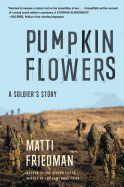
During the 1990s, the Israeli army maintained a string of hilltop forts in southern Lebanon to protect towns in northern Israel. At one such outpost, called the Pumpkin, boys beginning their mandatory military service spent time on guard duty, washing dishes and watching grainy VHS tapes, a tedium punctuated by deadly clashes with Hezbollah fighters. The Pumpkin shared its shielding mission with other benignly named outposts like Red Pepper, Basil and Citrus. When the soldiers in the Pumpkin were not under fire, setting up ambushes or searching for hidden bombs, they heard the euphemistic radio codes from their comrades who were under attack elsewhere: a wounded soldier was called a flower, a dead one a cyclamen.
"If you listened to the language of the Lebanon troops, you might have thought they occupied a kind of garden," says journalist Matti Friedman (The Aleppo Codex) in Pumpkinflowers: A Soldier's Story. Friedman, a veteran of several tours at the Pumpkin, weaves a poetic account of his own experience with that of another soldier who served at the outpost before him and Friedman's own harrowing trip back to Lebanon as a civilian after the Israeli army pulled out in 2000. Friedman captures a time and place where the new millennium seemed to promise peace instead of geopolitical conflagrations scorching the Middle East, when the Israeli experience in southern Lebanon felt like the trailing edge of a conflict instead of the beginning of a new type of war. Pumpkinflowers is a beautifully written, gut-wrenching book. --Tobias Mutter, freelance reviewer

